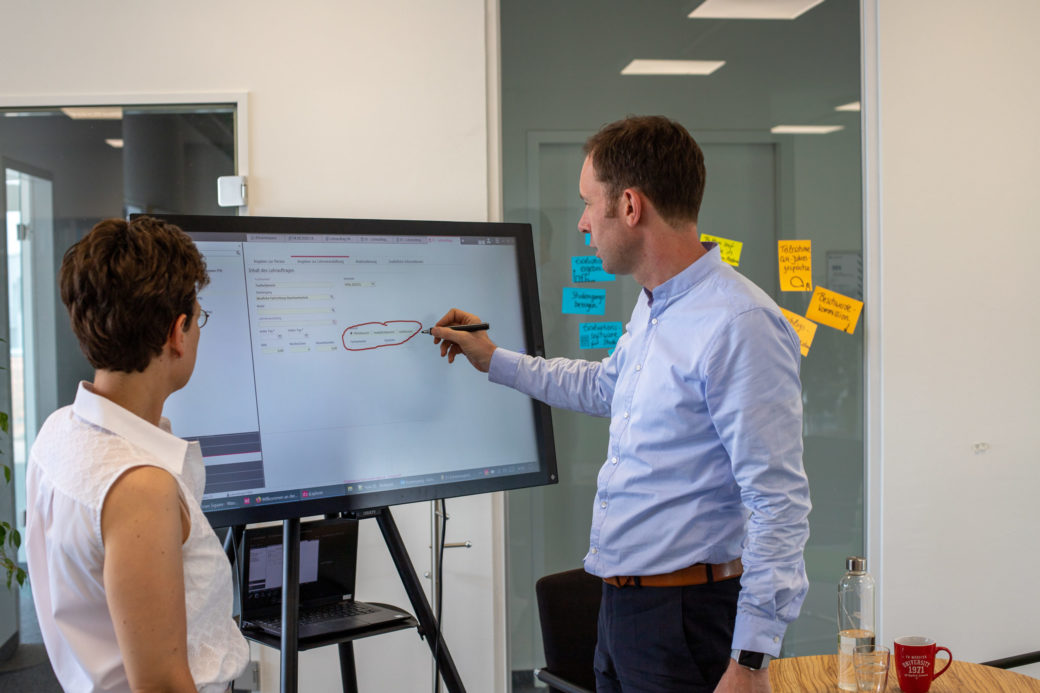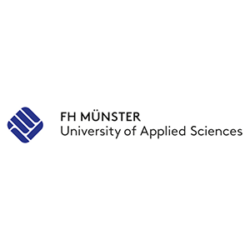FH Münster relies on ECM technology to improve internal processes.

FH Münster optimises internal processes using Enterprise Content Management (ECM) technology. Whether commissioning external lecturers, managing contracts, or processing electronic invoices – FH Münster has been improving its internal workflows for some time now through the use of ECM technology.
Prof. Dr Tobias Rieke teaches and conducts research at the Institute for Process Management & Digital Transformation. Since 2015, he has been leading digitalisation projects at FH Münster, particularly focusing on the implementation of electronic invoice processing and digital records. At the outset, he conducted a nationwide survey among German universities.
The results: One third of German universities already had ECM systems in place, another third were in the process of implementing them, and the remaining institutions had yet to begin. Since then, the proportion of universities equipped with ECM technology has likely increased significantly.
The use of ECM in the higher education sector is gaining significant momentum.
Prof. Dr. Tobias Rieke
Institute for Process Management & Digital Transformation at FH Münster
ECM as a Quality Initiative at FH Münster
The use of Enterprise Content Management (ECM) has become a key quality topic at FH Münster. The reasons are clear – and they were decisive in the university’s decision to introduce an ECM system in 2017. Given the geographically distributed faculties and central services, working with digital documents offers significant efficiency gains for any university. Personnel files, invoices, contracts, and other documents can now be accessed simultaneously from multiple locations. In addition to the HR and Finance departments, the Faculties of Health, Social Work, and Business also expressed a need for an electronic records system. Prof. Dr Tobias Rieke took on the role of project manager for the implementation of a document management system. The project is based at the Wandelwerk, FH Münster’s Centre for Quality Development.
The software was tendered across Europe, and FH Münster clearly opted for d.velop documents (formerly marketed as d.3ecm). The solution was implemented shortly thereafter by d.velop public sector GmbH (formerly codia Software GmbH). “We were looking for a partner for the entire university, and d.velop made the best impression,” says Tobias Rieke. A wide range of requirements was considered, including IT security. While integration with specialised administrative systems is often a key issue for local governments, it was less critical here due to the more streamlined IT landscape in higher education. More important was the availability of open interfaces to support cross-system processes and services. The ECM project began with contract management and digital teaching assignments – covering electronic application, allocation, and billing of teaching contracts.
50 Employees
are using d.velop’s contract management system in its final stage of implementation.
700 Teaching Assignments
are issued annually at FH Münster.
13 Faculties
now use d.velop documents for managing digital teaching assignments.
Contract Management as a Starting Point
The university’s commercial facilities management team handles a large number of contracts in the areas of services and maintenance. When these contracts are stored both physically and electronically across network and local drives, access becomes cumbersome and it’s often unclear whether the most up-to-date version is being used. Monitoring cancellation deadlines is also difficult, as there were previously only self-developed solutions based on Office tools – prone to errors and inconsistencies. The contract management module from d.velop addresses this issue and will be rolled out to other areas of the university. This would include additional contract types such as cooperation agreements with other universities or framework agreements with financial service providers.
Contract management is of strategic importance for the entire university – especially in light of the introduction of Section 2b of the German VAT Act (UStG), which stipulates that public bodies are subject to VAT when they generate income independently and on a sustained basis. The contract management system is intended to support the university in assessing whether contracts fall under this regulation. FH Münster is developing a corresponding assessment framework. Currently, contracts are being scanned and existing Excel-based contract data is being transferred into the system. Once fully implemented, around 50 staff members will be working with the contract management system.
eTeaching Assignments Involve the Entire University
While contract management primarily targets central administrative and service units, the eTeaching assignments process also involves the university’s faculties. Prof. Dr Tobias Rieke explains: “This topic was ideal as a pilot project because it focuses on a process that offers real added value across many areas – faculties, the HR department, staff council, and finance department – all of them are involved in teaching assignments.” Today, all 13 faculties at FH Münster use d.velop documents for managing eTeaching assignments.
What is an eTeaching Assignment?
An eTeaching assignment refers to the process of commissioning external lecturers entirely electronically, without any paper-based steps. At FH Münster, around 700 teaching assignments are issued each year.
Fully digitalised teaching assignment allocation and billing workflows
For each teaching assignment, the faculties now complete an electronic form, which is then forwarded to the HR department for further processing and final approval. A large proportion of these assignments must also be submitted to the staff council for co-determination. Previously, the entire process was partly paper-based and partly handled via PDF forms and Excel spreadsheets. Final approval was issued in paper form by post to the lecturer.
However, paper reduction was not the main driver behind the ECM project eTeaching Assignment. The focus was on process improvement and seamless, media-break-free collaboration between departments – enabling location-independent workflows. Today, the entire teaching assignment process is handled completely electronically within the ECM system. The d.velop documents solution supports faculties in completing the application form. This is then routed via workflow to the HR department. If co-determination is required, a template is automatically generated and submitted to the staff council at the click of a button. The council returns its decision directly through the system.
The final teaching assignment is also issued electronically: d.velop documents sends an email with the automatically generated assignment document to the lecturer – making the process entirely paperless. “The feedback has been very positive. All organisational units involved in the process are highly satisfied” says Katrin Hochmann from the Process Management Team at Wandelwerk, who was responsible for implementing the eTeaching assignment system. The system also supports the billing process for teaching assignments. In addition to full-time degree programmes, teaching assignments for part-time master’s programmes have now also been integrated into the system. As a result, all teaching assignment allocations and billing processes at FH Münster are now handled electronically.

Digital Student Record in HISinOne as the Next Step
As one of the first universities in Germany, FH Münster has fully implemented HISinOne and plans to begin integrating the digital student record using d.velop documents in 2020. The interface of the university software has been extensively customised and embedded into the “myFH” portal, where students can register for lectures and seminars, and view their exam results.
d.velop documents will also be integrated into this portal in the future. Implementing the digital student record involves addressing a wide range of requirements from examination offices and departmental secretariats, and establishing a new authorisation structure. This represents a significant amount of work for both FH Münster and the experts at d.velop – but it also offers the opportunity to build on the university’s previous successes in process improvement through digitalisation.
Software Demo
Learn More About d.velop Software
Request your personalised live demo of the d.velop software with just a few clicks. Get a live demonstration of the software and ask your questions directly. Simply fill out the form and we will get back to you.

